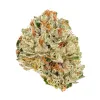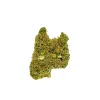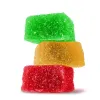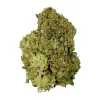In recent years, the cannabis industry has seen significant growth and innovation, leading to the discovery and development of various cannabinoids with unique properties, along with comparisons, such as HHC vs. THC. Among these cannabinoids, THC has long been the most well-known, while HHC is a newcomer that has garnered attention in the hemp and cannabis world. In this article, we will discuss what HHC is, its importance, and how it differs from THC and other cannabinoids.
The Definition of HHC
HHC, or hexahydrocannabinol, is a hemp-derived cannabinoid found naturally in the cannabis plant in trace amounts. It is a hydrogenated version of THC, which makes it more stable and resistant to oxidation, heat, and UV light.
The Importance of Understanding What HHC Is
Understanding HHC is crucial for consumers and medical professionals alike, as it offers a new option for those seeking the benefits of cannabinoids without the intense potency of THC. As the industry continues to grow and innovate, understanding the unique properties of different cannabinoids will enable individuals to make informed decisions about which compounds are best suited for their needs.
What is HHC?
As previously mentioned, HHC stands for hexahydrocannabinol. It is one of the newer cannabinoids on the scene, like THCP, and compares favorably to THC, like delta 8 vs. delta 10. is a cannabinoid derived from the hemp plant and is a hydrogenated version of THC. The hydrogenation process involves adding hydrogen atoms to the chemical structure of THC, which stabilizes the compound and increases its resistance to heat, oxidation, and UV light.
How Is HHC Different From Other Cannabinoids?
While HHC shares many properties with THC, it is distinct in both its chemical structure and its potency. The hydrogenation process that creates HHC replaces the double bond in THC with two hydrogen atoms. This change in structure results in HHC being approximately 70-80% as potent as THC, making it a less intoxicating option for those seeking the benefits of cannabinoids without the strong psychoactive effects associated with THC.
The Science Behind HHC
HHC was first synthesized in 1944 by American chemist Roger Adams, who added hydrogen molecules to delta-9-tetrahydrocannabinol (THC) to create HHC. Today, HHC is typically derived from hemp cannabinoids, such as delta 8 products. The hydrogenation process used to produce HHC is also common in the food industry, where it is used to convert vegetable oil into margarine.
While HHC has not been studied as extensively as THC or CBD, the limited research available suggests that it may have potential benefits, such as pain relief, anxiety reduction, and improved sleep. However, further studies are needed to fully understand the true potential of HHC and its possible applications in the medical and recreational cannabis industries.

Does HHC Get You High? The Potential Psychoactive Effects of HHC
As a hydrogenated version of THC, HHC does possess psychoactive effects, but they are less potent than those of its more famous counterpart. Users of HHC report experiencing a sense of euphoria, relaxation, and cerebral and bodily stimulation, which can be similar to the high produced by THC. However, due to its altered chemical structure, HHC is approximately 70-80% as intoxicating as THC, making it a milder option for those seeking a less intense experience.
Comparing HHC With Other Cannabinoids Like THC
THC is well-known for its powerful psychoactive properties, which can result in feelings of euphoria, heightened sensory experiences, and altered perceptions. On the other hand, HHC offers a more subdued version of these effects, making it a more suitable choice for users who want to enjoy the benefits of cannabis without the full intensity of a THC high.
Other cannabinoids, such as CBD, do not have any intoxicating properties, and instead offer potential therapeutic benefits like pain relief and anxiety reduction without causing a high. This makes CBD a popular choice for individuals seeking the potential health benefits of cannabis without any psychoactive effects.
Taking a Closer Look
In summary, HHC does have psychoactive properties and can produce a high, albeit a milder one than THC. This makes it an attractive option for those who want to enjoy the benefits of cannabis without the strong psychoactive effects associated with THC. It's important for consumers to consider their desired outcome and personal preferences when choosing between HHC, THC, CBD, or other cannabinoids.
For a closer look, see the table below:
|
Cannabinoid |
Psychoactive Effects |
Intensity of Effects |
|---|---|---|
|
HHC |
Euphoria, relaxation, cerebral and bodily stimulation |
70-80% as intoxicating as THC |
|
THC (Delta-9) |
Euphoria, heightened sensory experiences, altered perceptions |
100% intoxicating (most potent) |
|
THC (Delta-8) |
Euphoria, relaxation, mood elevation, reduced anxiety |
50-70% as intoxicating as Delta-9 THC |
|
CBD |
No psychoactive effects, but offers potential therapeutic benefits like pain relief and anxiety reduction |
Non-intoxicating |
|
CBG |
No psychoactive effects, but may have potential therapeutic benefits like anti-inflammatory and neuroprotective properties |
Non-intoxicating |
|
CBN |
Mildly psychoactive, primarily known for potential sedative effects and sleep aid |
Low intensity
|
The Benefits of HHC
HHC, or hexahydrocannabinol, has shown promising potential benefits for users looking for an alternative to traditional THC. Some of the key benefits of HHC include its ability to provide feelings of relaxation and euphoria, along with reduced anxiety and pain relief. The compound has also been linked to improved sleep quality and potential anti-inflammatory properties.
Additionally, HHC has been found to be less potent than THC, making it an attractive option for those seeking a milder psychoactive experience. However, it is important to note that research on HHC is still limited, and more studies are needed to fully understand its therapeutic potential and long-term effects.
That being said, let’s compare the potential medical and recreational benefits of HHC:
The Potential Medical Benefits of HHC
- Pain relief: HHC may help alleviate pain for various conditions, such as chronic pain, neuropathic pain, and inflammation.
- Anxiety reduction: HHC can potentially help reduce anxiety levels and promote relaxation.
- Anti-inflammatory properties: HHC may have the ability to reduce inflammation and associated symptoms.
- Improved sleep quality: HHC has been shown to increase sleep duration and promote better sleep.
- Nausea and vomiting relief: HHC could potentially help control nausea and vomiting, particularly for patients undergoing chemotherapy.
- Appetite stimulation: HHC may help increase appetite, which can be beneficial for patients with certain conditions or those undergoing treatments that cause appetite loss.
The Potential Recreational Benefits of HHC
- Euphoria: HHC can produce feelings of euphoria, providing an enjoyable experience for users.
- Relaxation: The use of HHC can promote a sense of relaxation, helping users unwind and destress.
- Cerebral and bodily stimulation: HHC may offer a balance of mental and physical stimulation, resulting in a unique recreational experience.
- Mild psychoactive effects: HHC is less potent than THC, making it an attractive option for those looking for a milder, more controlled high.
- Social bonding: HHC can potentially enhance social interactions and promote a sense of connection with others.
- Creativity boost: Some users report an increase in creativity and inspiration while using HHC, making it a popular choice for artistic and creative pursuits.

How HHC Affects the Body
HHC interacts with the body's endocannabinoid system (ECS), which plays a crucial role in regulating various physiological processes such as mood, sleep, appetite, and pain. It primarily binds to CB1 receptors found in the brain and central nervous system, resulting in psychoactive effects.
However, HHC is less potent than THC, which means its effects are milder and more controlled. This can be advantageous for those seeking the therapeutic benefits of cannabis without the intense psychoactivity that comes with THC use.
The Growing Body of HHC Products
There is a growing variety of HHC products available on the market, catering to different preferences and needs. HHC gummies are a popular option for those who prefer a discreet and convenient way to consume the compound. These gummies come in various flavors, making them an enjoyable and easy-to-dose option. HHC disposable vapes are another popular choice, especially for those who prefer inhaling the compound. These vapes offer a faster onset of effects and are available in numerous strains, providing users with a range of experiences to suit their individual preferences.
Types of HHC Products Available
- HHC oils and tinctures
- HHC edibles, such as gummies and chocolates
- HHC vape cartridges
- HHC-infused topicals, like creams and balms
- HHC capsules and tablets
How to Use HHC Products
- Oils and tinctures can be taken sublingually or added to food and drinks.
- Edibles are consumed orally and provide a discreet and convenient way to use HHC.
- Vape cartridges are used with compatible vaporizers and offer fast-acting effects.
- Topicals are applied directly to the skin for localized relief.
- Capsules and tablets are swallowed like any other pill.
Dosage Information - How to Dose HHC
HHC dosages vary depending on factors such as individual tolerance, body weight, and desired effects. It's recommended to start with a low dose (5-10 mg) and gradually increase until the desired effects are achieved. Always consult with a healthcare professional before using HHC, especially if you are new to cannabinoids or have a pre-existing medical condition.
For general dosing guideline for different HHC products, check out the chart below:
|
Product |
General Dosing Guideline |
|---|---|
|
HHC Gummies |
Start with a low dose, typically between 5-10mg per gummy, and wait at least 1-2 hours before assessing effects and increasing dosage. |
|
HHC Carts |
Begin with a small puff and wait 5-10 minutes to assess effects. Increase dosage gradually if needed, allowing time between puffs. |
|
HHC Disposable Vapes |
Similar to HHC carts, start with a small puff and wait 5-10 minutes to assess effects. Increase dosage gradually, allowing time between puffs. |
The Safety and Legality of HHC: Safety Concerns
HHC is generally considered safe when produced and consumed responsibly. However, it's essential to source HHC products from reputable manufacturers that adhere to strict quality standards. High-quality HHC products should undergo third-party lab testing to ensure their purity, potency, and safety. These lab results should be readily available for customers to review, offering transparency and peace of mind.
Avoid homemade or unregulated products, as they may contain impurities, incorrect dosages, or other potentially harmful substances. The production of HHC involves high temperatures and catalysts, making it potentially dangerous for inexperienced individuals to attempt the process. When choosing HHC products, always opt for established brands with a proven track record of safety and quality to ensure the best possible experience and minimize potential risks.
Legal Status of HHC
The legal status of HHC varies depending on local and federal laws. In some jurisdictions, HHC may be considered legal due to its derivation from hemp plants with less than 0.3% THC. However, always check your local laws and regulations before purchasing or using HHC products.
Potential Risks and Side Effects of HHC
While HHC is generally well-tolerated, some users may experience side effects. These can include dizziness, which may be a result of the psychoactive properties of HHC. Additionally, dry mouth is another potential side effect that users may experience. This is a common effect of many cannabinoids and is not unique to HHC.
Fatigue may also be a side effect of using HHC products. This could be due to the compound's relaxing and sedative effects on some users. Another potential side effect is changes in appetite. Similar to THC, HHC may affect appetite regulation, causing increased or decreased hunger in some individuals. It's important to use HHC responsibly and in moderation to minimize the risk of adverse effects. Always start with a low dose and increase gradually, as needed, to find the optimal dosage for your needs.
Will HHC Trigger a Drug Test?
HHC may trigger a positive result on a drug test due to its similarity in structure to THC. However, most standard drug tests screen specifically for THC and its metabolites. It's essential to inform the testing facility if you are using HHC products, as this may affect the interpretation of the results.

HHC vs. Other Cannabinoids
As the world of cannabis and hemp-derived products continues to expand, consumers are becoming more aware of the many cannabinoids that offer unique benefits and experiences. Hexahydrocannabinol (HHC) is one such compound that has recently garnered attention for its similarities and differences with other well-known cannabinoids, such as THC and CBD. In this section, we will explore how HHC stacks up against these other cannabinoids and delve into what sets it apart from the rest.
Comparing HHC to Other Cannabinoids
To see how HHC compares to some of the more popular cannabinoids on the market today, take a look at the table below:
|
Cannabinoid |
Psychoactive Effects |
Legality |
Medical Benefits |
Recreational Use |
|---|---|---|---|---|
|
HHC |
Mild |
Varies |
Pain relief, anxiety relief, sleep aid, anti-inflammatory |
Relaxation, euphoria |
|
Delta 8 |
Moderate |
Varies |
Pain relief, anxiety relief, appetite stimulation, anti-nausea |
Relaxation, mild euphoria |
|
Delta 9 |
Strong |
Varies |
Pain relief, anxiety relief, appetite stimulation, anti-nausea, PTSD treatment |
Euphoria, creativity, "classic" cannabis experience |
|
Delta 10 |
Moderate |
Varies |
Pain relief, anxiety relief, alertness, focus, energy booster |
Uplifting, energizing, focus-enhancing |
|
CBD |
Non-psychoactive |
Generally legal |
Pain relief, anxiety relief, anti-inflammatory, anti-seizure, neuroprotective |
Relaxation, stress relief |
The Research on HHC
Research is slim on HHC, as it is with most cannabinoids, but we do have some. Following its initial discovery in the mid-1900s, several studies were conducted to explore HHC's properties.
- In 1977, a study investigated the impact of HHC on rats, finding that the cannabinoid exhibited some similarities to narcotic painkillers, although significant distinctions were also noted.
- A 2007 study revealed that HHC prolonged sleep duration in mice by 80-700%. The researchers also observed that HHC's effects on the mice were akin to those of THC, but with a reduced psychoactive potency.
- A subsequent study in 2010 involving rats demonstrated that HHC persisted in the subjects for extended periods.
How HHC is Manufactured
HHC is typically synthesized in a laboratory setting due to its low natural occurrence in the cannabis plant. The process involves hydrogenation, where THC is saturated with hydrogen using high pressures and a catalyst, such as nickel, zinc, or palladium. This method breaks THC's double bonds and replaces them with two hydrogen atoms, resulting in the formation of HHC. The hydrogenation process not only changes the chemical structure of THC but also makes HHC more stable and resistant to oxidation, heat, and UV light.
Can You Build Up Tolerance to HHC?
As with many other cannabinoids, it is possible to build up a tolerance to HHC over time. Tolerance occurs when the body becomes accustomed to the presence of the compound, leading to reduced effects at the same dosage. Taking regular breaks from HHC or cycling between different cannabinoids can help manage tolerance levels.
Advantages of Choosing HHC
HHC offers several benefits that make it an attractive choice for those interested in exploring cannabinoids. Some of these advantages include its milder psychoactive effects compared to THC, making it a more controlled and manageable option. Additionally, HHC's more stable chemical structure provides a longer shelf life and duration of effects within the body. Furthermore, HHC has demonstrated potential therapeutic benefits, such as pain relief, anxiety reduction, and improved sleep, making it a versatile option for both recreational and medical users.

Wrapping Things Up
HHC, or hexahydrocannabinol, is a hydrogenated version of THC, offering milder psychoactive effects while still providing several potential therapeutic benefits. HHC interacts with the body's endocannabinoid system, primarily binding to CB1 receptors in the brain and central nervous system. It is found in various products such as gummies, vapes, and tinctures, and has a growing popularity among recreational and medical users.
What’s the Future Outlook for HHC?
As the popularity of cannabinoids continues to rise, HHC is expected to gain more traction in the market. With its unique combination of milder psychoactive effects and potential therapeutic benefits, HHC could become a more mainstream option for those seeking an alternative to THC or other cannabinoids. However, further research is necessary to fully understand the compound's properties, benefits, and potential side effects.
Final Thoughts and Recommendations
HHC offers an exciting opportunity for those interested in exploring the world of cannabinoids. Its milder effects and potential therapeutic benefits make it a versatile option for a wide range of users. It's essential to purchase HHC products from reputable sources and always consult a healthcare professional or follow the manufacturer's guidelines for proper dosing. As research on HHC continues to expand, we can expect a deeper understanding of this unique compound and its potential applications in the future.








